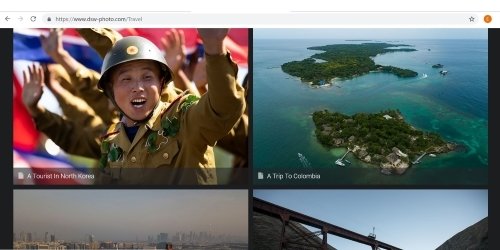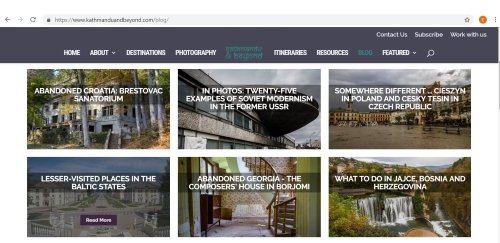First published: Sun 12 May 2019.
Els Slots
Debunking travel blog myths
Comments
6 comments
nan
6 years, 4 months ago (May 12, 2019)
I have to admit that I rarely read travel blogs on their own. Too much "Greatest", "Bestest" with gorgeous pictures that get repetitive fast.
With our mode of travel I also have less need to figure out where to go. I have a large backlog of places I want to visit. And for these places I already know my mandatory waypoints: the world heritage sites.
My primary interest re travel are practicalities. How do you get there? How do you get in? ... Travel blogs that got a driver etc. paid for are not helping in this regard. And while I think I am a reasonable well off traveler I can't and won't afford to stay at 5* hotels for a full vacation. So the post of the luxury resort in Oia/Bali/Antigua has zero benefit.
I do think I (and everyone in this community) have the maturity to sort out the sponsored content from the rest. I try to figure out the local prizes so I can judge if an offer is fair. I also try to evade all organized tours because I hate those. Hotels are done via booking.com; me and their rating system are aligned. Restaurants via lonelyplanet or tripadvisor.com.
For me the problem isn't with sponsored content per se. If you manage to pay for your travels by being an influencer, congrats!
To me the problem is that sponsored content has a too high signal to noise ratio.
Reply
Zoë Sheng
6 years, 4 months ago (May 12, 2019)
Most of these travel blogs are just for showing off their achievement, truth is they reap very little financial rewards and there is always some kind of "work with us", "buy my book" or "book hotels via my link" in the articles. There are surely some successful bloggers but it gives the idea that this is a model to follow. "Quit your day job and move to Chiang Mai to teach English while you travel" - so when I get to 40 I have no career and thus no pension, no way to pay my health insurance, that's all college kid thinking then.
Clyde
6 years, 4 months ago (May 12, 2019)
Well written, Els. I totally agree that getting paid ultimately has a direct or indirect effect on the content and or readers/blogger.
Nan, as long as only the name of a hotel (5 star or less) is mentioned mainly because of its location, I see no harm and find it useful - obviously I still compare accomodation online but once in a while, on special occasions or to enhance a particularly remote WHS, I tend to spend more than my usual budget.
nan
6 years, 4 months ago (May 12, 2019)
@Els: I think part of the annoyance is that plenty is done in the name of SEO. Backlinks from here are a nice way to improve your page rank. And channel some visitors to your page. Both obviously helping with the travel blog and influencer credibility.
Problem I have found is that this sites content, though regularly superior, gets lower page ranks, at least for the popular sites. It does feel we should SEO ourselves a bit...
@zoe: wouldn't call travel blogging a long term career option either ;)
Michael Ayers
6 years, 4 months ago (May 12, 2019)
Excellent post Els! I agree with everything you wrote.
I read an article a couple of months ago stating that the touristy island of Siargao in the Philippines is trying to discourage want-to-be Instagram "Influencers" from visiting there. Apparently, the endless stream of people showing up and saying "Hey, I'm an Influencer, can I stay at your hotel for free?" was getting to be too much for them to deal with (especially since most of those people had minimal followings when they arrived). I have tentative plans to go to Siargao later in my current trip, and am looking forward to laughing sarcastically if anyone there mentions Instagram or any social media (never used it-and never will).


